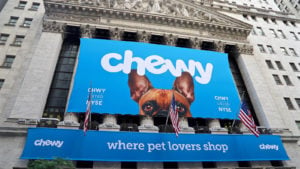Investors often think in terms of sectors — technology, energy, financials, etc. But perhaps they should be thinking in terms of industries instead. Pet stocks haven’t been hot for just a quarter or two, either.
This industry has been experiencing secular growth, helping drive sales higher and higher for a large number of companies. Many of these companies — such as Eli Lilly (NYSE:LLY) and Pfizer (NYSE:PFE) — have actually spun off their pet units to create value for shareholders.
As Bob Vetere, president of the American Pet Products Association (AAPA), said last year:
With spending on our pets higher than ever before, it’s clear that giving pets the best lives possible is still a top priority for pet owners, and they’re willing to spend more on the quality products and services they consume if it means more quality time with their beloved companions.
I think that about sums it up, really. Pet spending has been a long-term secular growth trend that applies to multiple industries. Whether that’s food, health, retail, grooming or specialty care. Further, those trends remain in place for more growth.
Let’s look at seven pet stocks to consider owning:
- Chewy (NYSE:CHWY)
- Zoetis (NYSE:ZTS)
- FreshPet (NASDAQ:FRPT)
- PetMed Express (NASDAQ:PETS)
- Idexx Laboratories (NASDAQ:IDXX)
- Covetrus (NASDAQ:CVET)
- JM Smucker (NYSE:SJM)
Pet Stocks to Buy: Chewy (CHWY)

How can we start this list without Chewy as our leadoff batter? This name is one of the most quintessential pet stocks imaginable. The entire business is focused on pet sales.
The company is an online e-commerce platform for everything pet related. It sells toys, food and over-the-counter medicine. It also sells equipment like crates, collars and leashes. It even has a pet pharmacy, although customers still need a prescription from their vet.
However, I like Chewy for one main reason: It marries two secular growth themes, which is e-commerce and pet spending.
As the world — not just the U.S. — increasingly views pets as family members, spending inevitably goes up. That extra toy just because. That little longer leash or more comfortable harness. That healthy food, even if it costs a little bit more.
As pet spending increases, Chewy is in a position to benefit. But more than that, as e-commerce continues to become a larger percentage of retail sales — and it is in a big way — the more customers are going to rely on Chewy.
The company is forecast to grow revenue more than 40% in 2020 and grow earnings more than 30%. In fiscal 2019, the company swung toward break-even free cash flow and it’s looking to build on that momentum moving forward.
Chewy is an ideal way to get some e-commerce and pet exposure in one simply play.
Zoetis (ZTS)

A popular name in the pet health space is Zoetis. This one’s a behemoth, commanding a $76 billion market cap.
The company is likely going to turn in slow top- and bottom-line growth this year, as it deals with the disruptions of the pandemic. The good news for Zoetis is that pet spending is going to continue, both in the long and short term.
Office visits have been lower for obvious reasons this year. But while visit growth has gone negative, veterinary practice revenue is still positive. That bodes well for the industry, as it reiterates that consumers view their pets as family. In the same way they wouldn’t ignore a heart attack for themselves, they’re not going to leave their pets out to fend for themselves when something goes wrong.
Longer term, the secular theme is alive and well.
Each year is seemingly a new record in pet spending, according to the American Pet Products Association. In 1996, annual pet spending was just $21 billion. In 2019 it was a record $95.7 billion.
Pet food was the largest spend category at $36.9 billion (more on that in a minute), followed by vet care and product sales at $29.3 billion. That’s where Zoetis sits, acting like an ATM for its investors. As a result, shares are up 275% over the past five years vs. a return of just 71% in the S&P 500. While the stock may seem stretched, this name is one to consider on the pullback.
FreshPet (FRPT)

The statistics in the last section are pretty impressive when it comes to pet spending. Given that the leading category is pet food, it’s only natural we look more closely at this space.
In the report, it stated:
“Consumers are more educated than ever about the ingredients that go into their pets’ food, which means they’re willing to pay more for quality products,” said King. “As the demand for natural, minimally-processed ingredients continues, we expect to see steady growth in this category.”
Given the momentum for high-end food, FreshPet has to be considered. When the pandemic hit, I thought FreshPet would be in trouble. Less shoppers at the stores meant the company’s refrigerated pet food might not be in as high of demand. That worry proved to be false, though.
At the start of 2020, current year revenue estimates stood at less than $250 million. Now? Expectations are north of $320 million.
Analysts expect more than 30% revenue growth this year and another 27% growth next year. Even better, FreshPet has positive earnings and very strong growth. This year alone, estimates call for 550% earnings growth, followed by more than 200% growth next year.
As King said, consumers are becoming more in touch with what’s in our pet’s food and as a result, shifting to higher-end, healthier options. With less pure-play pet food stocks on the market, FreshPet is one to be aware of (and it could even be an M&A target down the road).
PetMed Express (PETS)

We’ve already laid out the spending categories in the last few sections, which highlights why PetMed Express should be on our list.
Because of that data, we know a few things are clear. Volume is increasing for pet care, including medicines and prescriptions. We also know that the price of these treatments are rising. With Covid-19 creating a digital transformation — pushing more services and orders online — PetMed Express is in an excellent position to benefit.
That’s why its revenue is forecast to jump more than 10% this year, while earnings are forecast to climb almost 18%. I also like that this stock isn’t in the spotlight as much as some of the others on this list.
Sure it’s nice to have one of your pet stocks at new all-time highs. But that makes it tough for new investors to buy. PetMed Express shares hit a new high in July, but have since fallen about 25%. Amid that decline, we’ve seen its dividend yield swell to 3.5%. That’s more than six times the yield from the 10-year Treasury bond!
This is a company with solid earnings and revenue growth, no debt, positive free cash flow and a reasonable price-to-earnings (P/E) ratio of about 21.
Idexx Labs (IDXX)

Getting into the health side of the pet industry, Idexx Labs is a name that comes to mind. This company blends technology and medicine to drive its growth.
Even amidst a pandemic, Idexx Labs is steady when it comes to growth. Analysts predict revenue growth of 8.1% this year to go alongside 14.7% earnings growth.
Take a minute and appreciate how impressive it is that Idexx is growing at a time where most companies would be lucky just to see break-even results this year, let alone growth. But it doesn’t stop with 2020. The company is forecast to grow revenue and earnings another 10.5% and 12.1% in fiscal 2021, respectively.
As pet costs continue to rise, so too does the company’s revenue. Idexx offers in-clinic diagnostic test kits, medical instruments and consumables. Its premium instruments division actually grew its installation base in the quarter, while management said that, “Revenue results [were] supported by global ‘V-shaped’ recovery in the pet healthcare market.”
It’s hard not to look at all the positives with Idexx.
Covetrus (CVET)

Covetrus may not be a well-known name among pet stocks, let alone in the stock market. I am only aware of it because I closely track Henry Schein (NYSE:HSIC).
Henry Schein is a well-known name across multiple industries — assuming you are talking about pets and dental. In any regard, the company spun off its pet business and merged it with Vets First Choice. The business became known as Covetrus, and it’s been on fire over the last few months. It wasn’t always that way, though.
Shares opened for trading at $38 in February 2019. The stock really struggled out of the gate, hitting its high on its first day of trading and falling lower in the months that followed.
While it was trading at more than 50% below its initial opening price as it came into 2020, it at least had some bullish momentum working in its favor. Then Covid-19 hit and shares were buried. Covetrus hit a low of $4.05 in March but has now rallied six-fold, to north of $26.
The company is not an extreme growth company, but it does have steady growth. Analysts expect about 5% revenue growth this year and 6% growth next year. Even though estimates call for a 6.5% decline in earnings this year, Covetrus is expected to return to growth in 2021 and still remains profitable this year.
With just a $3 billion market capitalization, this one may be worth a look.
JM Smucker (SJM)

JM Smucker has a spot on this list of pet stocks. The company makes more than peanut butter and jelly. Many investors may not realize how many brands this company controls, particularly in the pet industry. However, you may very well recognize some of this company’s brands, including Meow Mix, Milk Bone, Kibbles ‘N Bits and Natural Balance, among others.
I’ve already highlighted how pet food is the highest spending category for U.S. pet owners. For JM Smucker, pet food is also the top revenue generator for its business. Last quarter, U.S. retail pet food sales rang in at $767.8 million, up 6% year over year. Further, that was almost 37% of the company’s total revenue.
Segment profit of $149.6 million grew 14% year over year as margins climbed 130 basis points.
Obviously this company has exposure to other industries, but some would argue that it helps balance things out. After all, many of the stocks above were not standalone companies at one point. Most were spun off from larger corporations, helping to create long-term value.
Of course, it helps that the company pays out a 3.1% dividend, which has been raised for 19 straight years.
On the date of publication, Bret Kenwell held a long position in CHWY and PETS.
Bret Kenwell is the manager and author of Future Blue Chips and is on Twitter @BretKenwell.
